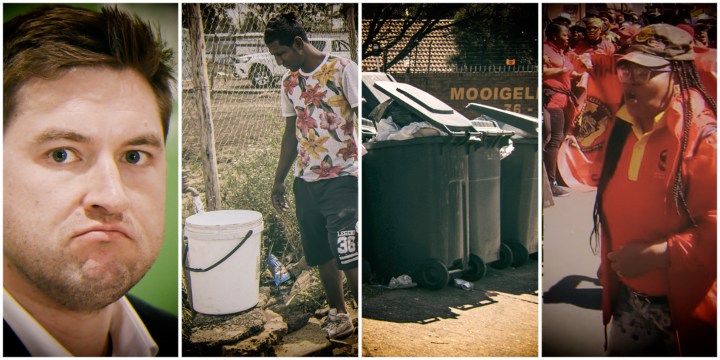MUNICIPAL CRISIS
Financially distressed Tshwane battles with ongoing strike, water shortages and service delivery failures

The cash-strapped City of Tshwane continues to face challenges with a labour strike and is struggling to maintain the collection of waste and the provision of water and electricity. To add to its troubles, there are water shortages at some of its reservoirs.
The embattled City of Tshwane is feeling the pinch as “pockets” of municipal employees remain on a six-week wage strike, crippling some service delivery functions. At the same time, taps are running dry due to water shortages at several reservoirs.
In a joint statement on Thursday afternoon, the City of Tshwane and Rand Water said they continued to observe a “downward trend” in the water levels at nine reservoirs including Magaliesberg, Soshanguve, Mooikloof and Mabopane.
“The City of Tshwane continues to notice an increase in water demand because of high water consumption which is putting a strain on Rand Water and City of Tshwane’s (CoT) water supply systems. This has prompted both CoT and Rand Water to fortify interim and urgent water conservation and water demand management mechanisms to ensure sustainable provision of water in CoT.”
This comes days after a public spat over who is responsible for the city’s taps running dry. Initially, the MMC for utility services, Themba Fosi, blamed “issues” with Rand Water’s supply.
The utility hit back at what it labelled “unsubstantiated remarks” and claimed, “Tshwane consumers use too much [water] compared to world averages.”
The spat came to an end after an intervention by the national government, led by Minister of Water and Sanitation Senzo Mchunu and his deputy, David Mahlobo.
Mahlobo told SABC News the department was pleased that the spat had come to an end as it had been diverting attention from providing water and understanding the issues. Following the intervention, technical teams were put together to deal with the situation.
However, Mahlabo could not say when the water crisis would be resolved.
“It does not necessarily mean that the water situation has been resolved because the system for the water in Tshwane must be managed in totality; it means that they need to keep the range in terms of storage between 60-70% in their reservoirs and it has been struggling to do that.”
Mahlobo said an additional 210 million litres per day had been allocated to the metro by Rand Water.
Reasons for the failure to keep reservoirs at desired levels include load shedding and decay of the secondary reservoirs, according to the ministry.
“The population has grown and the infrastructure has not been increased. As we speak, there are four reservoirs that are below 60% and they are affecting the areas of Soshanguve and Mabopane,” Mahlobo said.
Residents threaten protest
Frustrated residents of Mabopane, whose taps have been dry for two weeks, have threatened to take to the streets in protest. Block B resident Mammelo Nkandimeng said complaints to the city had fallen on deaf ears.
“We have been struggling with water for more than two weeks now. Sometimes the water tankers come and other times they just don’t. When that happens, we have to buy bottled water — that is expensive because you need water for the entire family.”
MMC Fosi said, “We are committed to addressing the issue of water leaks and ensuring prudent use of our precious and scarce resources. In recent months, the city has identified and we have prioritised the repair of water leaks as a primary concern.”
The metro has long struggled with a water crisis. A recent cholera outbreak was centred in Tshwane’s Hammanskraal, which reportedly accounted for 23 of 47 deaths.
President Cyril Ramaphosa visited the area to apologise for the deaths and commit to resolving the crisis.
“We are sorry that it has taken the deaths of a number of people, even though we have not yet confirmed that the cholera deaths are as a result of the water supplied to residents. Your basic human right of having clean water — we have not lived up to your expectations as the people of Hammanskraal,” said Ramaphosa.
“We have failed you, the people of Hammanskraal.”
Samwu strike
Not only have residents had to deal with an intermittent water supply and electricity outages, but their waste has not been collected for weeks in many areas. The city’s spokesperson, Selby Bokaba, blamed this on the ongoing, illegal and violent wage strike by workers affiliated with the South African Municipal Workers Union (Samwu).
Samwu is SA’s biggest local government union, representing more than 150,000 municipal employees. Last month the employees took to the streets demanding a pay increase of 5.4%, a figure which was agreed upon at the SA Local Government Bargaining Council.
Read more in Daily Maverick: City of Tshwane vows to stick to staff salary freeze despite strikes
Bokaba said most of the employees who had downed tools had returned to work, but some were still on strike, which was crippling some service delivery functions.
“There are still some pockets of employees who are still persisting with the unlawful and unprotected strike,” Bokaba said.
Precious Theledi, the regional secretary of Samwu, however, denied any involvement of Samwu members in the ongoing strike. “Our members are all at work.”
The city said residents were suffering from the strike.
“We are feeling the pinch mainly in the areas of waste collection, water and sanitation and electricity outages.
“There are a few areas that haven’t had waste collection for a prolonged period. We are making use of contractors to deal with backlogs. We are also attending to water and electricity outages, although the turnaround times have been impacted by the striking employees,” Bokaba said.
Last week, the protests turned violent when two waste removal trucks were set alight. This led to some service providers withholding their services for safety reasons.
Bokaba said, “We have terminated the service contractors who were refusing to work and we’re making use of those who are willing to work and are going the extra mile to render services.”
A total of 123 employees have been axed for participating in the strike.
“We have also recalled salaries of those that reported for duty by signing in and out the attendance register, but failed to execute their duties,” Bokaba told Daily Maverick.
Samwu’s Theledi confirmed that more than 400 members had been affected by the city’s decision to recall salaries, insisting the members in question had been on leave, sick, or had simply forgotten to sign the work attendance register.
Samwu is now preparing to take the city to the Labour Court in a bid to compel it to return the recalled salaries and challenge the firing of the 123 employees.
Despite the strike having lasted for more than a month, the city believes it has been able to contain it. Police service and private security have also been roped in.
“Our resources have been stretched to the limit. Intimidation against employees remains a concern. Teams are being escorted by private security and TMPD [Tshwane Metro Police Department] when they go out to attend to service delivery,” Bokaba said.
Money problems
The metro remains in financial distress. It has racked up a debt to Eskom of almost R2-billion. The city has admitted the problem, but it’s not clear where the money will come from to settle the debt.
Read more in Daily Maverick: Trouble with a capital T – Jacaranda City municipality is wilting under bad finances and scandal
Executive Mayor Cilliers Brink said a raft of measures had been implemented in an attempt to save the city and put it on a path of financial recovery.
According to Bokaba, “These raft of measures [sic] include zero payment of salary increase, reduction of 30% expenditure, amongst others. Importantly, there’s a plan in place to collect maximum revenue, including from debtors such as government departments and embassies.”
Following the city’s failure to pay the salary increases, it filed an exemption application at the SA Local Government Bargaining Council on 10 August and the hearing took place on 30 August. The city expects the outcome of the application no later than 10 September. DM


















 Become an Insider
Become an Insider
Comments - Please login in order to comment.